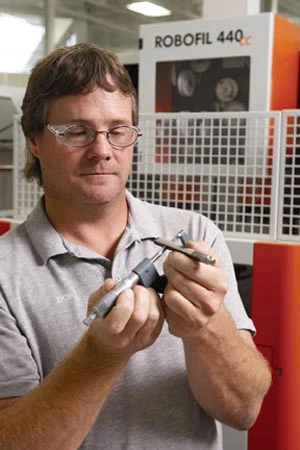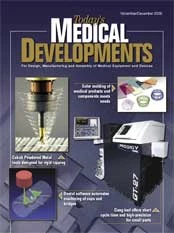
Primarily due to the lower labor costs associated with part production, overseas manufacturing continues to challenge U.S. manufacturers. To remain successful during this time of fierce global competition, many manufacturers are pursuing faster turnaround times, constant innovation and higher levels of flexibility. By increasing its capabilities, a machine shop becomes less dependent on others and more able to control its own future. For Ultra Machining Company (UMC), a custom precision manufacturer serving the medical and aerospace industries, embracing this idea has afforded the company continued success.
Operating his business out of his garage in Hamel, Minnesota, founder Terry Tomann worked hard establishing a firm reputation for providing high quality medical components. To his credit, the company has experienced steady growth throughout its history; however, as surgical processes became more advanced, UMC began outsourcing a great deal of wire EDM work.
"During the 1995 NTMA national fundraiser, Charmilles donated a six month lease of a Robofil 310F for auction. Our founder, Terry Tomann, had a vision of UMC doing EDM work in-house and he bid on the Charmilles machine to put that vision to the test," says Randy Hatcher, vice president, UMC.
After six months with the machine, Mr. Tomann's vision became reality, and UMC opted to purchase the machine. Eventually, the Charmilles 310F was operating at full capacity, using 15% of its time for tooling and 85% for part production. Because the wire EDM allowed UMC to achieve better surface finishes, closer tolerances and faster speeds where traditional machining methods could not be utilized, the company purchased another Charmilles EDM, a 330F, in 1999.
Today, medical products manufacturing represents 80% of UMC's business. They now produce orthopedic, vascular and arthroscopic instruments for major U. S. medical product manufacturers. The remainder of UMC's work is dedicated to the production of fuel delivery systems and internal aircraft components for top tier aerospace manufacturers, all of which require extreme precision.
"Charmilles' machines certainly contribute to UMC, offering unparalleled quality and efficiency to our customers," explains Hatcher. "We are also committed to being a lean resource, finding ways to improve productivity to benefit our customers. Not only has this increased our customer satisfaction, but it has also enabled us to remain competitive."
Operating in the fiercely competitive markets of medical and aerospace, UMC recognized that it could not reach its desired levels of growth and success with lean manufacturing alone. As a result, the company implemented a unique management infrastructure that is comprised of a five-member strategic team and a six-member leadership team.
"Because UMC employees have a very high competency level, the number of supervisors is comparatively low," comments Hatcher. "We have one strategic team dedicated to high-level decision-making, and a leadership team that manages the day-to-day operations of our employees and production. This management style works for UMC because we value the capabilities of each of our employees. We believe that highly skilled and educated machinists should be doing work that fully recognizes and capitalizes upon their talents."
Upon recognition that UMC's current EDM machines were being maximized to full capacity, the company knew it needed to invest in another. At the beginning of 2004, the company purchased its third EDM, a ROBOFIL 440cc, and two years later, the System 3R WorkPal robot. The ROBOFIL 440cc, known for its reliability, guaranteed that UMC could still provide positions of value to its employees. The machine's CC generator, ThermoCut wire threading system and collision protection all work together, allowing the ROBOFIL 440cc to run efficiently and unattended. With this efficiency, UMC uncovered yet another benefit of the machine – freeing up operator time, which allows for more valuable work.
After integrating the ROBOFIL 440cc into its manufacturing processes, UMC was consistently producing parts with impressive cutting speeds up to 42 square inches an hour and achieving higher quality surface finishes with fewer skim cuts. Equipped with Charmilles' sophisticated CC generator, the ROBOFIL 440cc was performing a third faster and holding closer tolerances than UMC's other EDMs. As a result, the ROBOFIL 440cc proved to be particularly helpful in the manufacturing of an internal sagittal saw component for orthopedic surgery. The high- wear piece is extremely difficult to machine, requiring tolerances of 0.0003-in. on one feature and 0.0005-in. on another feature.
"The ROBOFIL 440cc let us master the manufacturing of this part perfectly, achieving a surface finish between 20µm and 32µm," explains Hatcher. "However, this part is in incredibly high demand for our customers, and we knew we needed a more robust system to improve our delivery time, increase capacity and remain the supplier of choice. Because today's delivery times are about half what they were five years ago, we needed a system that guaranteed complete dependability and reliability for our operations. That's when we decided to purchase the System 3R WorkPal robot."
The System 3R WorkPal robot, combined with the ROBOFIL 440cc, has not only afforded UMC the ability to automate its processes, but also to run lights out on the weekends. UMC maximizes the WorkPal's capabilities, loading one dozen sagittal saw components on each of its 12 pallets, enabling the efficient production of 144 pieces.
Before UMC decided to implement automation, the total production time for its sagittal saw component on the ROBOFIL 440cc was close to 48 hours. With the WorkPal automation, production time was reduced to 30 hours.
"The robustness of this entire system has yielded impressive results for UMC," comments Hatcher. "The levels of productivity and reliability achieved through automation reduce labor costs per part to levels comparable to overseas competition. For UMC, that is hugely important, since we've recently seen global competition begining to impact the medical industry."
Being able to run lights out has saved UMC considerable time and money. Currently, the company is running its ROBOFIL 440cc with automation 24/7, completely maximizing the capabilities of the machine.
"Our machinists know that Charmilles' machines can handle virtually anything, which has provided UMC a great deal of flexibility in our production processes," notes Hatcher. "It's our goal to maximize the capacity of our machines, and we've certainly put Charmilles to the test. Being able to run the ROBOFIL 440cc 24/7, while achieving consistent parts with unbeatable quality, is a true testament to the machine's worth."
UMC currently occupies a state- of-the-art, 73,000 sq. ft. facility in Monticello, Minnesota, which employs 145 people. Increasing demand from medical and aerospace manufacturers has led UMC to a conservative forecast of $30 million in annual sales within five years. Part of this future growth may be attributed to the integration of other automation systems and Charmilles machines, including the possibility of a diesinker EDM for their prototype division. Through automation, UMC is prepared to handle increasing global competition, the pressure of faster delivery times, continual innovation and most of all, controlling its own success.
Charmilles
Lincolnshire, IL
charmillesus.com

Explore the November December 2006 Issue
Check out more from this issue and find your next story to read.
Latest from Today's Medical Developments
- Arcline to sell Medical Manufacturing Technologies to Perimeter Solutions
- Decline in German machine tool orders bottoming out
- Analysis, trends, and forecasts for the future of additive manufacturing
- BlueForge Alliance Webinar Series Part III: Integrate Nationally, Catalyze Locally
- Robot orders accelerate in Q3
- Pro Shrink TubeChiller makes shrink-fit tool holding safer, easier
- Revolutionizing biocompatibility: The role of amnion in next-generation medical devices
- #56 Lunch + Learn Podcast with Techman Robot + AMET Inc.





